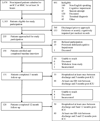Psychiatric symptoms and acute care service utilization over the course of the year following medical-surgical ICU admission: a longitudinal investigation*
- PMID: 25083985
- PMCID: PMC4236258
- DOI: 10.1097/CCM.0000000000000527
Psychiatric symptoms and acute care service utilization over the course of the year following medical-surgical ICU admission: a longitudinal investigation*
Abstract
Objective: To determine if the presence of in-hospital substantial acute stress symptoms, as well as substantial depressive or posttraumatic stress disorder symptoms at 3 months post-ICU, are associated with increased acute care service utilization over the course of the year following medical-surgical ICU admission.
Design: Longitudinal cohort study.
Setting: Academic medical center.
Patients: One hundred fifty patients who are 18 years old or older admitted to medical-surgical ICUs for over 24 hours.
Interventions: None.
Measurements and main results: Participants were interviewed in-hospital to ascertain substantial acute stress symptoms using the Posttraumatic Stress Disorder Checklist-Civilian version. Substantial depressive and posttraumatic stress disorder symptoms were assessed using the Patient Health Questionnaire-9 and the Posttraumatic Stress Disorder Checklist-Civilian version, respectively, at 3 months post-ICU. The number of rehospitalizations and emergency department visits were ascertained at 3 and 12 months post-ICU using the Cornell Services Index. After adjusting for participant and clinical characteristics, in-hospital substantial acute stress symptoms were independently associated with greater risk of an additional hospitalization (relative risk, 3.00; 95% CI, 1.80-4.99) over the year post-ICU. Substantial posttraumatic stress disorder symptoms at 3 months post-ICU were independently associated with greater risk of an additional emergency department visit during the subsequent 9 months (relative risk, 2.29; 95% CI, 1.09-4.84) even after adjusting for both rehospitalizations and emergency department visits between the index hospitalization and 3 months post-ICU.
Conclusions: Post-ICU psychiatric morbidity is associated with increased acute care service utilization during the year after a medical-surgical ICU admission. Early interventions for at-risk ICU survivors may improve long-term outcomes and reduce subsequent acute care utilization.
Conflict of interest statement
Dr. Davydow has had full access to all the data in the study and takes responsibility for the integrity of the data and the accuracy of the data analysis. The funding organizations had no role in the design and conduct of the study; collection, management, analysis, and interpretation of the data; preparation, review, or approval of the manuscript; and decision to submit the manuscript for publication.
Figures
Comment in
-
Posttraumatic stress symptoms in critical illness survivors: yet another reason they matter?*.Crit Care Med. 2014 Dec;42(12):2627-8. doi: 10.1097/CCM.0000000000000579. Crit Care Med. 2014. PMID: 25402281 No abstract available.
References
-
- Halpern NA, Pastores SM. Critical care medicine in the United States 2000–2005: an analysis of bed numbers, occupancy rates, payer mix, and costs. Crit Care Med. 2010;38:65–71. - PubMed
-
- Lone NI, Seretny M, Wild SH, et al. Surviving intensive care: a systematic review of healthcare resource use after hospital discharge. Crit Care Med. 2013;41:1832–1843. - PubMed
Publication types
MeSH terms
Grants and funding
LinkOut - more resources
Full Text Sources
Other Literature Sources
Medical


